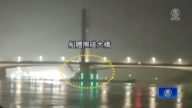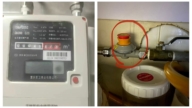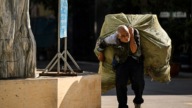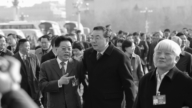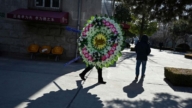【新唐人2014年04月22日訊】4月19號,中國《胡潤百富榜》發佈了《中國富豪特別報告》。報告說,在「百富榜」發佈的15年裡,有27位上榜富豪犯罪入獄,佔上榜總人數的1.2%,有過半數人被判有期徒刑10年以上。那麼,是甚麼原因使得這些富豪入獄呢?請看以下分析報導。
從1999到2013年,登上《胡潤百富榜》的富豪人數為2,188位,其中27位是「問題富豪」,佔上榜總人數的1.2%。
這些「問題富豪」中,超過半數的人年齡在40到49歲之間,46歲是被判刑時的平均年齡。而貪污賄賂、侵犯財產和妨害對公司、企業的管理秩序等,是富豪出問題的三大主因。
報告顯示,這27名富豪被判刑的罪名共有65條,平均每人2.5條。其中「貪污賄賂罪」是富豪入獄的最主要原因,其中犯「單位行賄罪」的比例最大,有7人。
另外,在涉及「侵犯財產罪」中,「職務侵佔罪」和「挪用資金罪」的比例最高。
時事評論員藍述認為,中共把中國傳統文化破壞了,這些富商在沒有道德的約束後,跟這些貪官污吏打交道中很容易學壞,從而走上犯罪道路。
時事評論員藍述:「在中國社會裏面無官不貪,你生意稍微做大一點那就要跟這些貪官污吏打交道。你跟貪官污吏打交道,這個錢進進出出你怎麼入帳啊?送出去的錢、進來的錢,是灰色收入或者是灰色支出?」
藍述表示,中共官員現在幾乎沒有乾淨的,高層搞反貪也是選擇性的打擊政敵,那些與政敵有聯繫的富豪,就成了中共內鬥的犧牲品。
如﹕2005年被《胡潤百富》雜誌列為中國首富的黃光裕,在2009年,因犯非法經營罪、內幕交易罪、單位行賄等罪,被判有期徒刑14年。而根據國務院有關人員透露,黃光裕案是公安部部長孟建柱與上屆總理溫家寶聯盟,搞掉鄭少東、打擊周永康的動作。
旅美中國問題評論人士李善鑒:「中國這個富豪基本上都是最近幾年湧現的。他並不是因為很聰明、很能幹,也不是因為自己祖輩上就有這個家業、就有這個資產,而是多半通過這種權錢交易、這種不正當的手段來獲得的這種資產。」
還有,山西女商人丁書苗,因涉嫌行賄前鐵道部長劉志軍被起訴,其中涉非法經營的金額達1,788億元,向劉志軍行賄4900萬元﹔而前上海富豪周正毅和張榮坤,因為與中共高官陳良宇、黃菊以及江澤民家族的關係而迅速爆富,但也因牽連陳良宇、黃菊等官員,而分別被判處有期徒刑16年和19年。
「中國社會科學院私營企業主群體研究中心」副秘書長呂鵬,今年1月在上海《東方早報》發表了關於「中國富豪從哪來」的研究成果。他選擇的研究對像,是2003到2012年,所有曾在「胡潤」或「福布斯」富豪榜上出現過的富豪。
呂鵬研究發現,15.6%富豪的父親,曾經擔任過黨政機構和企事業單位幹部,其中中國富豪榮智健的父親榮毅仁,曾於1993到1998年擔任中共國家副主席,而王健林的父親,曾任西藏自治區的副主席﹔另外,43.6%富豪曾在「體制內」工作過,如原深圳市委常委、深圳市副市長葉澄海,以及曾擔任「華南電子進出口公司」常務副總經理的黃宏生等。
旅美中國問題評論人士李善鑒指出,中國真正的富人是那些「紅色家族」的人,他們的財產難以統計,外人也難以知道。
2012年底,美國《彭博社》經濟網站經過極為慎密的調查後,發現中共「八大紅色家族」的後代們,不僅控制者中國,他們的財富也是驚人,僅王震兒子王軍,鄧小平的女婿賀平,陳雲兒子陳元,這三人所佔有的財富就多達1萬6000億美元。
而今年國際媒體也曝光了中共「紅色資產」,通過持有離岸公司轉移巨額資產,隱藏巨額財富的做法。報告顯示,自2000年以來約有4萬億美元的資產從大陸流出。
採訪/朱智善 編輯/宋風 後製/孫寧
27 of Hurun ‘s Richest Chinese Jailed in 15 Years
Hurun Report published a special report on April 19, of the
15 years of Hurun China rich people, 27 were jailed,
accounted for 1.2% of reported.
More than half of them were jailed for more than 10 years.
What are the causes for these rich Chinese to be jailed?
Please follow our report.
Between 1999 and 2013, 27 of the 2,188 Chinese who made it
to the Hurun China Rich were the ‘problem rich ‘, accounting
for 1.2% of the total number of the list.
Age 46 is the average year when the problem riches were
sentenced.
Corruption & bribery, property violation and disrupting the
managerial order of companies and enterprises are the three
main charges against the rich.
The report showed there were a total of 65 charges against the
27 richest Chinese, that is 2.5 charges per person.
They were sentenced mainly for corruption & bribery, of which,
offering a bribe to a unit was the most often seen charge against
7 people.
In addition, crime of duty aggressiveness and crime of capital
embezzlement are the most often seen charges in the crime of
property violation.
Commentator Lan Su believes that the Communist Party has
destroyed traditional Chinese culture.
In the lack of moral constraints, these wealthy Chinese are
easily able to work with corrupt officials and carry out criminal
activities.
Lan Su, commentator: “The corrupt officials fill Chinese
society nowadays.
Any decent sized business would require dealing with the
government.
To work with these corrupt officials, how can you balance
the book? Should they be the gray income or gray expense?"
Lan Su indicates there ‘s barely any innocent Chinese official
in the regime.
Even the anti-corruption campaign is selectively engaged with
political opponents.
Those rich businessmen in relationship with the opponents
become the sacrifice of the internal struggle of the Communist
Party.
Take Huang Guangyu as an example, the Hurun richest
Chinese in 2005. He was sentenced to 14 years
imprisonment for crimes of illegal business operation, insider
trading, bribery and offering a bribe to a unit.
Sources from the State Council revealed that Huang Guangyu ‘s
case was intended to overthrow Zheng Shaodong and
Zhou Yongkang through the coordinated work of the Minister
of Public Security Meng Jianzhu and former Premier Wen Jiabao.
Li Shanjian, China issue commentator: “The rich Chinese
have just emerged in recent years.
It is not because they were very smart or capable, and their
wealth is not inherited either.
They have become the rich Chinese mostly because of the
colluding of money and power, through improper means."
Shanxi businesswoman Ding Shumiao was indicted for
bribing Minister of Railways Liu Zhijun with the amount of
49 million yuan, and collecting illegal operating funds of
178.8 billion yuan.
Former Shanghai billionaires Zhou Zhengyi and Zhang Rongkun
were overnight richest because of their relationship with high
officials and their relatives such as Chen Liangyu, Huang Ju,
and Jiang Zemin.
However, they were also sentenced to 16 years and 19 years,
respectively, for implication in the charges against
Chen Liangyu and Huang Ju.
Shanghai local newspaper reported a research paper conducted
by Shanghai Academy of Social Sciences in January about
where the Chinese rich came from.
Researcher Lu Peng targeted the rich Chinese on the Hurun
Report or Forbes rich list between 2003 and 2012.
Lu Peng found that 15.6% of the riches ‘ fathers were cadres
of the party or the enterprise units.
For example, Chinese tycoon Rong Zhijian ‘s father, Rong Yiren
was Vice President of the regime between 1993 and 1998;
China’s richest person Wang Jianlin ‘s father was once the Vice
Chairman of the Tibet Autonomous Region.
In addition, 43.6% of the rich Chinese have worked within
the regime. For example, Ye Chenghai had been Shenzhen
Municipal Standing Committee and vice mayor of Shenzhen;
Huang Hongsheng was the deputy General Manager of China
National Electronics Imp & Exp South-China Co.
Commentator Li Shanjian points out that the real rich Chinese
are those “Red Family" whose properties are difficult to
calculate and hidden from outsiders.
Bloomberg reported in 2012, three children alone,
General Wang Zhen ‘s son, Wang Jun;
Deng Xiaoping ‘s son-in-law, He Ping;
and Chen Yuan, the son of Mao ‘s economic tsar, Chen Yun,
headed or still run state-owned companies with combined
assets of about US $1.6 trillion in 2011.
This year, the international media have exposed the Chinese
Communist Party “Red Nobility" own offshore companies to
transfer and hide huge assets.
Estimated of up to $4 trillion in “untraced assets" may have
left China since 2000.
Interview/Zhun Zhishan Edit/SongFeng Post-Production/SunNing


